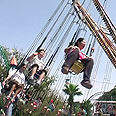

Life in Sderot has come to a standstill as rockets launched from Gaza continue to rain down on its residents, especially for the town’s 3,000 children, who are forced to remain indoors all day rather than risk the chance that they won’t be able to reach a bomb shelter quickly enough during a rocket attack.
In order to allow the children of Sderot to play more freely, the Jewish National Fund (JNF) embarked on a massive project: Building the largest indoor playground in Israel.
“Sderot has been under siege for seven years,” said JNF President Stanley M. Chesley. “We can’t stop the rockets from falling but we can give these children an opportunity to escape the anxiety and fear that they are forced to live with.”
The 21,000 square-foot indoor playground, a $5 million project, would be located in a secure industrial zone and feature recreational and exercise facilities for children ages 16 and under, including jungle gym equipment, a soccer field and volleyball court, a rock climbing wall, a snack area and gift shop, a movie and television area, a disco, swing sets, a merry-go-round, and more.
The facility will be under the supervision of the Israeli Army Engineers for Security Clearances and the educational arm of the IDF is set to provide after-school tutoring services. There will also be three therapy rooms to help children suffering from trauma.
'Afraid every hour of day'
A recent study showed that at least 75% of children aged four to 18 in Sderot suffer from post-traumatic stress, including sleep disorders and severe anxiety. Some 120 children are currently undergoing long-term mental health therapy.
"These children are afraid every day, every hour of the day,” said Dinah Houri, a school teacher in Sderot. “Wherever they go and whatever they do, they must think about what they will do if an alarm sounds. The question is always ‘where will I hide?'”
Chelsey explained this fear. "From the time a siren goes off indicating an incoming rocket, Sderot’s residents only have 15 seconds to make their way to a bomb shelter; not enough time if you’re a young child playing outside with friends or riding around the neighborhood on your bicycle, or really doing anything that kids do, so they don't do anything,” he said.
“Not only do we want to give them a place to go but we also want to give them some pride back. With this facility, they will be able to say to their friends in other parts of the country, ‘Look what I have.' It will be a badge of honor.”















